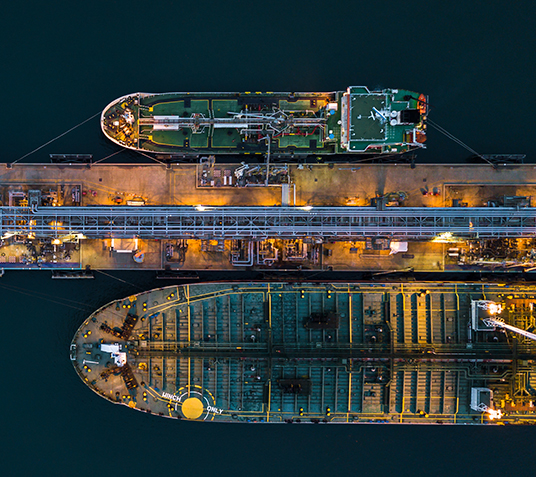

Organizational Impact
The course approaches the audit process in the context of international standards and therefore, it is equally suitable for sea-going and office-based staff and its benefits are as following:
• • Organize an emergency preparedness plan and identify the components and procedure in the proper implementation during emergencies
• • Demonstrate the process of emergency evacuation by locating the evacuation and personnel escape routes and performing trainings and drills
• • Apply the procedure of communication and mooring in the safety management of oil/gas/chemical tanker
• • Determine the precautions on ship during cargo handling and carryout proper procedure on bunkering operations including the use of bunkering safety checklist
• • Recognize the safety management of oil/gas/chemical tankers by developing awareness on climatic conditions, personnel safety, guidelines for completing the ship safety checklist and emergency actions
Upon the successful completion of this course, each participant will be able to:-
• Apply and gain a comprehensive knowledge on safety management of oil/gas/chemical tankers according to the international standards
• Identify the properties of petroleum namely vapour pressure, flammability and density of hydrocarbon gases and discuss their hazards accordingly
• Discuss static electricity and identify the other sources of electrostatic hazards including its general precautions
• Determine the general hazards for ship and carryout proper management of electrical equipment and installation in dangerous areas
• Define fire-fighting including its methodology, types of fire and extinguishing agents
• Employ security as applied in the safety management of oil/gas/chemical tankers
• Identify the parts and functions of the shipboard system and explain in detail equipment commonly found in ships
• Explain the management of safety and emergencies according to the ISM code and determine the shipboard emergency management
Personal Impact
Persons attending this course to be able to:
• Recognize the hazards associated with enclosed spaces and recognize of the control and safeguards for enclosed spaces entry
• Develop in-depth knowledge with the shipboard operations including the process of tank cleaning, gas freeing, crude oil washing, ballast operations, etc.
• Employ correct procedure on carriage and storage of hazardous materials
• Recognize human element considerations for the safety management of oil/gas/chemical tankers
• Identify the special ship types including their features, functions and its importance
• Explain cargo transfer equipment including its parts and function and employ safety and fire protection on oil/gas/chemical tankers by complying with the guidelines and standards impost by IMO, ICS, OCIMF and IAPH
This course provides an overview of all significant aspects and considerations of HSE standards settings of export facilities and marine terminals for terminal managers, marine operations managers, superintendents, supervisors, engineers and other technical staff, safety and environmental managers, tanker masters, marine logistics management, facility managers, spill management team members, transfer supervisors, marine shipping coordinators and dock maintenance planners.
DAY 1 Hazards on board tanker and ways to deal with them
• Basic Properties and Hazards of Petroleum
• Static Electricity
• General Hazards for a Ship
• Fire-Fighting
• Security
DAY 2 Shipboard Systems and Operations
• Shipboard Systems
• Ship’s Equipment
• Management of Safety and Emergencies
• Enclosed Spaces
• Shipboard Operations
DAY 3 Carriage of Hazardous Materials
• Carriage and Storage of Hazardous Materials
• Human Element Consideration
• Special Ship Types
• Precautions on ship during cargo handling
• Bunkering Operations
DAY 4 Vessel Operations (Oil/Gas)
• Oil Tankers (Crude and Product): cargo handling, transfer
• Oil Tankers (Crude and Product): Ship’s Stability, Shipboard operations
• Gas carriers (LPG/LNG): shipboard operations
• Inert Gas, Crude Oil Washing, Ballasting
• Pumping rate
DAY 5 : Chemical Tankers
• Cargoes in chemical tankers, physical properties, hazards
• Regulations in chemical tankers industry, ship design and equipment requirements
• Cargo Handling Systems
• Safety Management System on chemical tankers
• Tank cleaning operations, ship-shore interface
CDGA attendance certificate will be issued to all attendees completing minimum of 80% of the total course duration.
| Code | Date | Venue | Fees | Register |
|---|---|---|---|---|
| MAR120-01 | 29-03-2026 | Jeddah | USD 5450 | |
| MAR120-02 | 29-06-2026 | Kuala-Lumpur | USD 5950 | |
| MAR120-03 | 27-09-2026 | Dubai | USD 5450 | |
| MAR120-04 | 06-12-2026 | Manama | USD 5450 |
Providing services with a high quality that are satisfying the requirements
Appling the specifications and legalizations to ensure the quality of service.
Best utilization of resources for continually improving the business activities.
CDGA keen to selects highly technical instructors based on professional field experience
Since CDGA was established, it considered a training partner for world class oil & gas institution
3012, Block 3, 30 Euro Business Park, Little Island, Co. Cork, T45 V220, Ireland
Mon to Fri 09:00 AM to 06:00 PM
Contact Us anytime!
Request Info